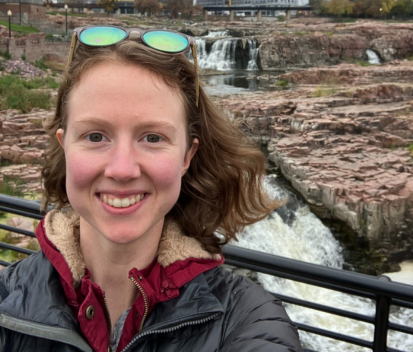 Name: Anna Moore
Name: Anna Moore
Title: Sustainability Support Specialist
Segment/Site: Campus, South Dakota system
Years with Sodexo: 1 ½
Areas of expertise: Sustainability, waste reduction, recycling, low-waste event planning
Anna Moore is passionate about educating and inspiring college students about sustainability. She has been a sustainability support specialist for the South Dakota university system, which spans six campuses. In almost two years in her current role, her focus has been on collaborative projects with students and the community. We caught up with Anna to talk about some of her favorite sustainability initiatives to date.
Interviewer: What makes you passionate about CSR and sustainability work?
Anna Moore: I’ve been passionate about reducing waste since I was a kid. Over the years, that motivation has expanded, and my favorite thing now about sustainability and CSR work is the way it can help us change how we see ourselves and help people see themselves as capable of making change. In a campus setting, that's easy to see with students who are forming their ideas about who they are as independent adults in the world. I love seeing that change from someone who is a passive participant in a system to that person taking on an active role in making it better.
Interviewer: What is the most satisfying or impactful CSR project you’ve worked on?
Anna Moore: One project that has been rewarding is working with my colleagues here at USD to develop a collaborative internship program — part of the Sodexo national internship program — that brings together the health and wellness intern, the sustainability intern and the marketing intern on larger projects instead of seeing their respective areas as separate.
One example was during WasteLESS Week last fall. The interns created videos during the waste competition between two of the campuses in South Dakota. They went to the local landfill and learned about how it works and where the food goes, focusing on sustainability. Then we did a second video about what students can do to reduce plate waste. I loved that because it had the sustainability motivation, but it was also informed by health and wellness and ideas around intuitive eating and how those come together when you encourage students to pause and notice how they feel and pay attention to their hunger cues before deciding where to eat or what to eat. The final product was more impactful than what the sustainability or health and wellness interns could have created on their own. Coupled with the marketing intern’s skills, the projects turned into something that was accessible and informative for all students. I was really proud of these videos, and they won the competition.
Interviewer: How can Sodexo’s Better Tomorrow Commitments help our clients reach their sustainability goals?
Anna Moore: As a former campus recycling coordinator, I know that our operations directly impact the clients’ goals around waste reduction. And from doing the annual site engagement assessment (SEA), we see that our operations go beyond waste to affect most aspects of sustainability. Efforts in these areas go a long way toward working with clients. From interacting with students on campus, I know that sustainability has a strong appeal. By following through on our sustainability commitments, we can help clients give students more meaningful experiences while they are here.
Interviewer: What should companies be doing to truly move us toward a healthier planet?
Anna Moore: Moving toward a healthier planet requires intentional change, and so companies should be thinking of it strategically and about how to change thoughts, behaviors and systems. It takes courage to do things differently because change can be a challenge, requiring strong teamwork and support for anyone who has the motivation to be part of the change-making process. I've found it to be most effective when goals and programs involve as many stakeholders as possible. Channels of communication become important, as well as setting goals and programs that connect environmental sustainability with social sustainability and economic sustainability, so people can relate to the goals and know that their lives are better because of these changes.
